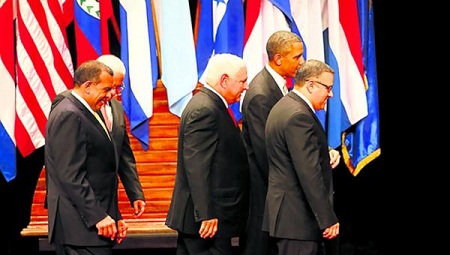The meeting in Costa Rica with the heads of State and President Obama will focus on many issues including the need to our countries to obtain inexpensive natural gas from the United States. It is a win win for everyone.
President Ricardo Martinelli’s concern on the electricity issue was raised at the meeting of the Central American Integration System (SICA) with the president of the United States (U.S.), Barack Obama, held on Friday night in San Jose, Costa Rica.
At the meeting they talked about the opportunity for Central American countries to buy U.S. natural gas at better prices.
“If we have expensive energy, we will have expensive food and an uncompetitive economy… we requested President Obama to consider the opportunity of assisting Central American countries so we could buy gas from the U.S. at competitive prices,” said the president.
Moreover, Martinelli, like his Central American colleagues, requested the U.S. more help to fight against drug trafficking in the region. He added that they need the support of those countries with more resources to combat problems such as this one, which causes insecurity in the area.
Meanwhile, yesterday, Martinelli attended the forum “Central America, Regional Private Sector and Civil Society Perspectives on Inclusive Sustainable Development”, at which Obama spoke before more than 200 businessmen, which was organized by the Central American Institute of Business Administration (INCAE).
At this meeting, Obama outlined the request of the Central American presidents of lowering the costs of electricity.
“It is critical to create a regional energy market” in Central America, he argued, while recognizing that the high cost of electricity in these nations “is a disadvantage for businesses and families,” emphasizing that it is three times more expensive than Washington, the U.S. capital.
In his view, it is urgent to develop “scale economies and mechanisms to resolve the issue of costs”, and this includes not only the physical infrastructure but also the necessary regulatory frameworks for the existence of a regional market.
Obama said he will soon take a decision on whether U.S. can export natural gas and when he does, he will consider Central America and the rest of the continent. (Panama America)
In a follow up story Obama is making pledges. Hopefully Congress does not kill them as usual.
President Barack Obama said in Central America on Saturday that the United States might be able to help relieve that region’s growing energy demands by exporting liquefied natural gas, a move opposed by some U.S. businesses and environmentalists. At a development forum that ended his three-day trip to Mexico and Costa Rica, Obama held out the prospect that surging supplies of natural gas in the United States could be sold in the area to help reduce its energy costs.
Obama’s Energy Department is to decide in the coming months, possibly this summer, whether to approve more than two dozen applications for natural gas exports to companies in countries that do not currently have a free-trade agreement with the United States. It is one of the first big energy decisions he faces early in his second term. Obama made a case for taking the step. The United States, riding a surge of natural gas production, is likely to be a net natural gas exporter as soon as 2020, he said.
He said he discussed with Central American presidents at a dinner on Friday night how U.S. natural gas can be used by the region as a bridging mechanism to relieve its energy demands until alternative energy sources can be increased. “I’ve got to make an executive decision broadly about whether or not we export liquefied natural gas at all,” Obama said. Helping Central America would be a factor in the decision-making, he added.
U.S. companies that produce the gas feel the supply is more than adequate, but some U.S. businesses oppose large-scale liquefied natural gas exports out of concerns it will dramatically increase the price of the energy in the United States. Environmentalists have raised concerns as well about the impact of increased production on the U.S. environment. Participants at the forum, where Obama and Costa Rican President Laura Chinchilla both spoke, said energy is a pressing concern in Central America.
“The most expensive energy is that which is lacking, and there are 1.8 million Hondurans today who don’t have access to energy,” said Eduardo Atala, president of the American Chamber of Commerce in Honduras as well as a member of the Honduran Council of Private Enterprise. Central America’s electric generation mix went from 66 percent hydropower, 30 percent thermal and 4 percent renewables in 1990 to 41 percent hydropower, 47 percent thermal and 13 percent renewable in 2008.
The region’s demand for more energy is increasing. By 2030, the World Bank estimates that Central America will need $25 billion in power sector investment to address increasing demand. “We need cheaper, cleaner and more renewable energy in Central America,” Guatemalan President Otto Perez told Reuters. “We can’t ever be competitive if we keep the current electricity prices,” he added, saying he hoped to more than halve his country’s electricity prices.
Obama’s remarks closed out a Latin American tour at which he put economic relations on an equal footing with security concerns about drug cartels that have been the main U.S. focus in the region for years. “The main message that I have is that the United States recognizes our fates are tied up with your success,” Obama said. “We want to be a partner.”
